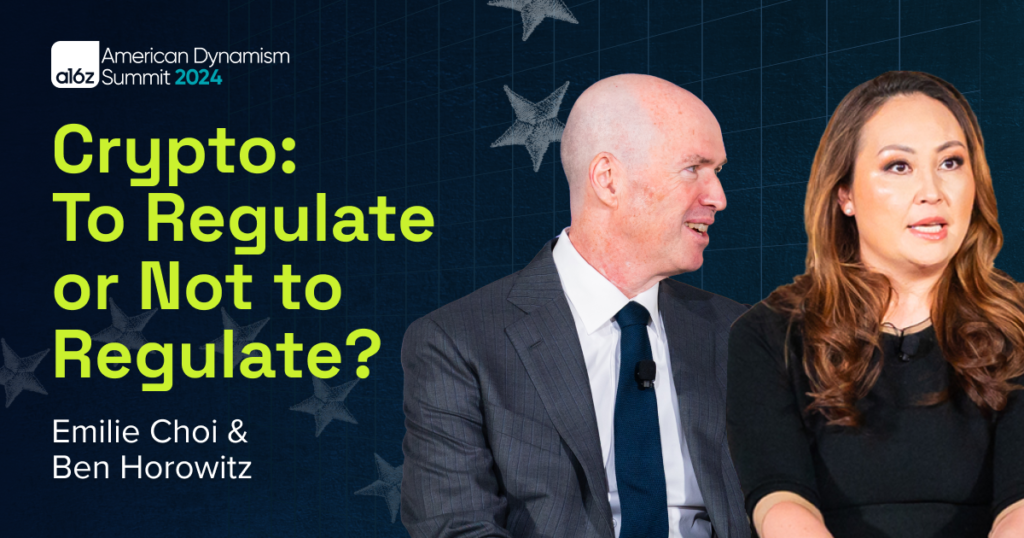Title: Enhancing National Competitiveness through Crypto Regulation Featuring Emilie Choi from Andreessen Horowitz

In this talk with a16z General Partner Ben Horowitz, from the a16z American Dynamism Summit, Coinbase President and Chief Operating Officer Emilie Choi discusses, among other things, crypto’s potential to power the next-generation internet and bolster individual freedoms — two major reasons why America should not only embrace crypto, but take charge in shaping its future.
Here is a transcript of their conversation:
Ben Horowitz: So, I’ve got Emilie, who is the very distinguished chief operating officer of Coinbase. So, we’re gonna talk crypto this morning. And so, those of us in the crypto world have been very, very nervous that the U.S. may be losing its lead in what’s very likely the next generation of the internet. But there are some out there that say, “Oh, let crypto go offshore. We don’t want it.” How do you think about that?
Emilie Choi: I think it’s a travesty. I really think it’s a travesty. And I think the U.S. falling behind on crypto is not dissimilar from what we’ve seen with chips and what we’re having to do now with the chips bill. I think it’s like 5G, I think it’s a national security issue and threat to not have critical technology infrastructure built in the United States. And I think there’s technologies that we don’t always understand, whether it’s crypto, whether it’s AI. The instinct should not be to be like, push it off, push it offshore, or push it back in the bottle.
Ben: Yeah. When has that been a good idea?
Emilie: It’s never been a good idea. It’s never been a good idea. And the genie is out of the bottle. And we see all sorts of countries and regions starting to adopt sensible crypto frameworks. For example, 80% of the G20 now either has enacted or is in the process of enacting crypto legislation and regulation, and we just haven’t done anything here. And so, the net result is that 70% of crypto developers are now offshore, and thus the technology and data will continue to be built offshore. So, I think this has to be the year where we do something, we enable very sensible regulation here. You don’t often hear industries saying, like, “Please give me some lines. Please give me some level of regulation here so that we have some rules of the road.” You know, we have an organization called Stand With Crypto that has more than 275,000 advocates for crypto. It’s these entrepreneurs in all the different states. They come and they meet with their local representatives and senators and their friends in Singapore and other countries are saying, like, “Why would you build here? This is, like, such a dangerous thing to do here because here’s no rules of the road.” So, that’s what we have to do. We have to push stuff forward in the U.S.
Ben: So there were kind of no rules of the road on the internet to a large degree. How is crypto different? Like, what’s going on in the U.S. that makes that, like, a very bad idea?
Emilie: What makes out a very bad idea is that we have overzealous regulators such as the SEC, who are overstepping their boundaries. We’ve seen with the FTC that they’re overstepping on antitrust and thus not enabling any M&A to happen. With the SEC, they issued a wells notice to Coinbase about a year ago. And the thing is that we have an exchange, we have something that… there’s a parallel analogy in financial services. There’s ways to create certain lines around this, but update them for 2024 and beyond, that is the difference and I think it helps ultimately really protect customers and consumers, which should all be in our interests.
… (continued content)
Source link
#Regulating #Crypto #National #Competitiveness #Emilie #Choi #Andreessen #Horowitz





